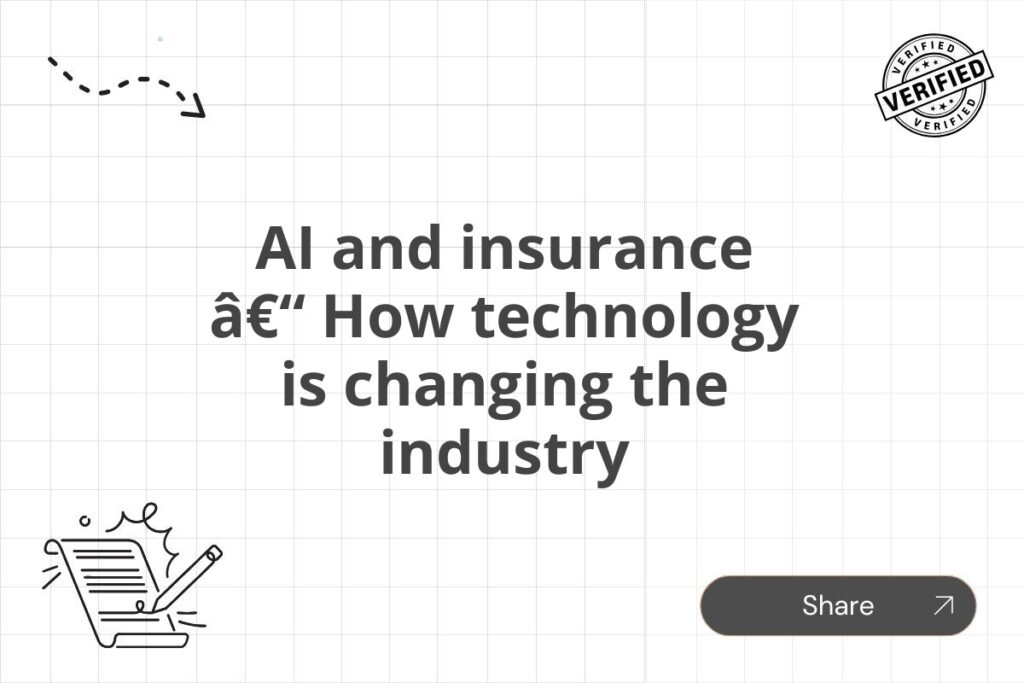Meta Description: AI is revolutionizing the insurance industry, from automated claims processing to personalized risk assessment. Learn how this technology is transforming insurance and its impact on the future.
The insurance industry, traditionally known for its reliance on paperwork and manual processes, is undergoing a dramatic transformation thanks to the rapid advancement of artificial intelligence (AI). AI is no longer a futuristic concept; it’s a powerful tool reshaping how insurance companies operate, interact with customers, and assess risk. This article delves into the profound ways AI is changing the insurance landscape, exploring its impact on various aspects of the industry from underwriting and claims processing to customer service and fraud detection.
AI’s Impact on Underwriting
Underwriting, the process of assessing risk and determining insurance premiums, is a core function of any insurance company. Traditionally, this process was heavily reliant on human underwriters reviewing extensive application forms and assessing various risk factors. This was a time-consuming and potentially subjective process. AI is now streamlining and enhancing this crucial stage.
Automated Risk Assessment
AI algorithms can analyze vast amounts of data far more quickly and efficiently than human underwriters. This data includes applicant information, credit scores, historical claims data, and even social media activity (with appropriate consent, of course). By identifying patterns and correlations that might be missed by human analysis, AI can provide more accurate and consistent risk assessments. This leads to more precise premium pricing, reducing both underpricing (leading to losses) and overpricing (driving customers away).
Predictive Modeling
AI’s predictive capabilities are also valuable in underwriting. By analyzing historical data, AI can predict the likelihood of future claims. This allows insurers to proactively manage risk, offering customized policies and pricing to specific customer segments based on their predicted risk profile. This level of personalization is impossible to achieve with traditional methods.
Improved Efficiency and Speed
AI significantly reduces the time it takes to underwrite applications. Automated processes can handle the initial assessment of applications, flagging those requiring further human review, freeing up underwriters to focus on more complex cases. This translates into faster policy issuance and a more efficient overall workflow.
AI’s Role in Claims Processing
The claims process, often a source of frustration for both insurers and policyholders, is another area where AI is making a significant contribution. The traditional process can be slow, bureaucratic, and prone to errors.
Automated Claims Handling
AI-powered systems can automate many aspects of claims processing, such as initial claim registration, document verification, and damage assessment (especially in areas like auto insurance, where image analysis can estimate repair costs). This automation reduces processing times and minimizes human error.
Fraud Detection
AI excels at identifying patterns indicative of fraudulent claims. By analyzing vast datasets and identifying anomalies, AI can flag potentially fraudulent claims for further investigation. This helps insurance companies minimize losses from fraudulent activities and maintain the integrity of the insurance system.
Improved Customer Experience
Faster and more efficient claims processing translates into a better customer experience. Policyholders receive quicker payouts and experience less frustration with the process. This can lead to increased customer satisfaction and loyalty.
AI and Customer Service
The interaction between insurance companies and their customers is being revolutionized by AI. AI-powered chatbots are increasingly prevalent, providing instant answers to frequently asked questions, guiding customers through the policy purchasing process, and resolving simple issues without the need for human intervention.
24/7 Availability
AI-powered chatbots offer 24/7 availability, providing customers with support whenever they need it. This is a significant improvement over traditional customer service models which often have limited operating hours.
Personalized Interactions
AI can personalize customer interactions based on individual customer data and preferences. This allows insurers to provide tailored advice and support, enhancing the customer experience and fostering stronger customer relationships.
Improved Efficiency and Cost Reduction
By automating routine customer service tasks, AI frees up human agents to focus on more complex and demanding customer inquiries. This improves efficiency and reduces the overall cost of customer service.
AI and the Future of Insurance
The integration of AI into the insurance industry is still in its early stages, but its potential is immense. We can expect to see even more innovative applications of AI in the coming years.
Hyper-Personalization
AI will enable insurers to offer hyper-personalized insurance products and services tailored to the specific needs and risk profiles of individual customers. This will lead to more relevant and affordable insurance solutions.
Proactive Risk Management
AI will facilitate proactive risk management, allowing insurers to identify and mitigate risks before they materialize. This will lead to fewer claims and lower costs.
New Insurance Products and Services
AI will pave the way for the development of entirely new insurance products and services that were previously unimaginable. We can expect to see innovative solutions addressing emerging risks in areas like cybersecurity and climate change.
Enhanced Transparency and Trust
By improving the efficiency and transparency of the insurance process, AI can enhance trust and confidence in the industry. This is crucial in maintaining the integrity of the insurance system and fostering positive relationships between insurers and their customers.
Challenges and Considerations
Despite the numerous benefits of AI in insurance, several challenges and considerations need to be addressed.
In conclusion, AI is profoundly reshaping the insurance industry, offering significant benefits in terms of efficiency, accuracy, and customer experience. While challenges exist, the potential of AI to improve the insurance sector is undeniable. As AI technology continues to evolve, its integration into the insurance industry will only deepen, creating a more efficient, customer-centric, and resilient insurance ecosystem.






















